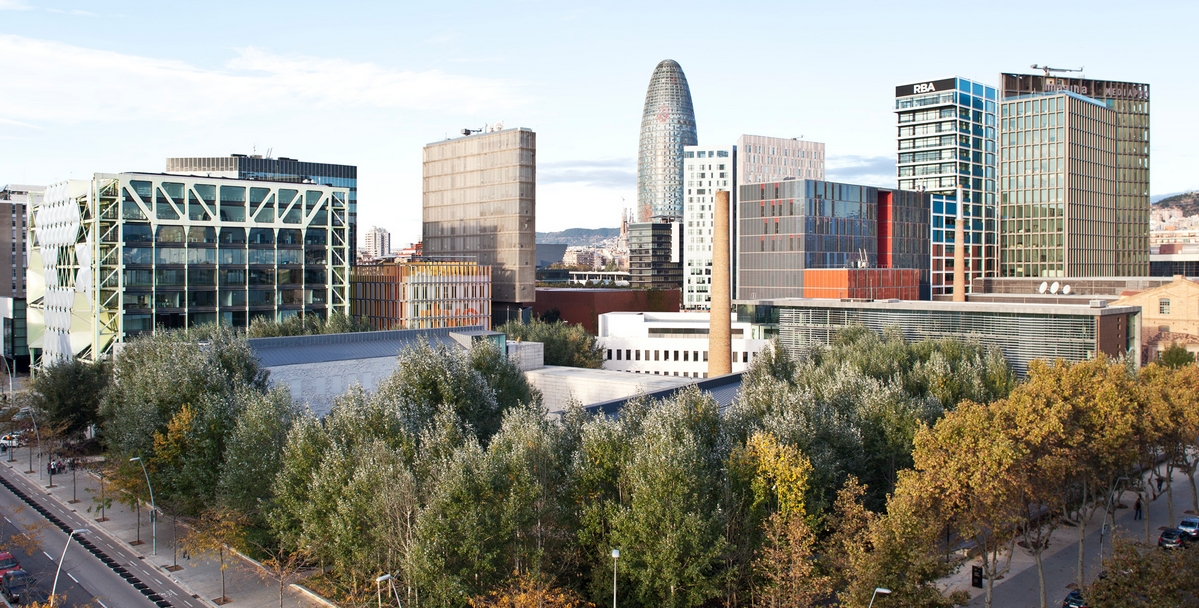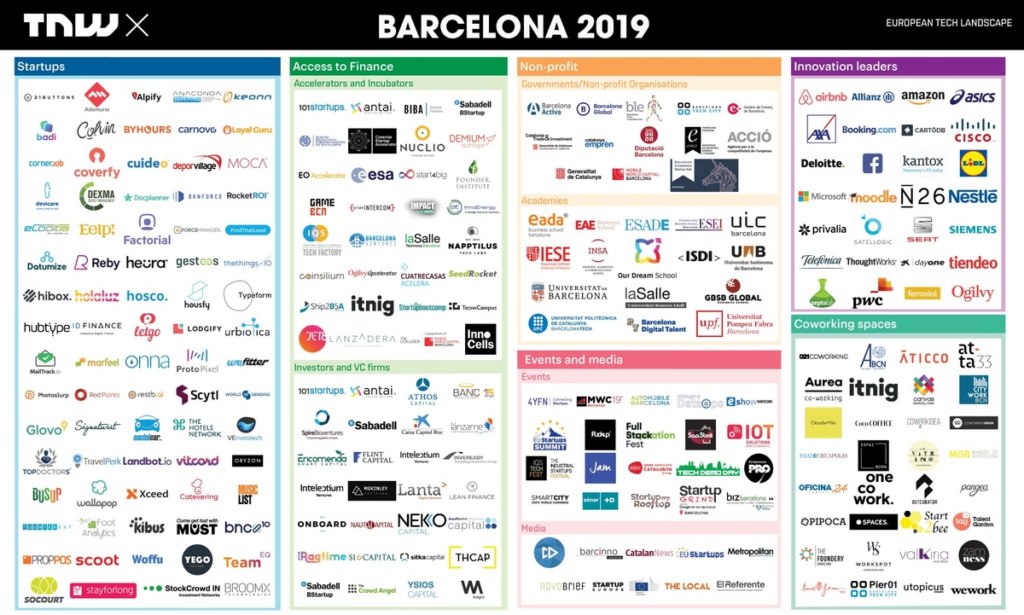
Why Barcelona is THE place to base your startup
At the beginning of April, The Next Web X rounded up over 200 key players of the Barcelona startup scene. It mentioned ESEI as one of the business schools shaping the local ecosystem. We were honoured to be included in such illustrious company, and it got us thinking: what makes Barcelona an internationally recognised tech hub?
As a young entrepreneur-to-be studying at ESEI, there’s a good chance that you moved here not only because you love the city and you’re studying here, but also because you’re looking at it as a potential base for your first company.
Here’s what you need to know about the startup ecosystem in Barcelona, and why you should consider launching your first venture here.

Barcelona is the most active startup city in Spain
Barcelona may not be the official capital of Spain, but it is certainly the country’s startup capital.
Thanks to the unwavering spirit of innovation that has characterized the city long before technology came into the picture and a collaborative community that would be hard to find anywhere else, Barcelona has unequivocally become the place where things happen.
It’s not that Barcelona is the city with the highest number of startups in Spain. In fact, Madrid actually has a few more, with 30% (1,235) of Spain’s startups residing in Madrid and 29% (1,197) in Barcelona.
The reasons why Barcelona truly feels like Spain’s number one startup hub is because this is where most of the country’s startup activity is concentrated.
A good indicator of the level of local startup activity in a region is the amount of capital invested. To see why Barcelona deserves the title of a dynamic startup hub, let’s get our hands dirty and dig into the nitty-gritty of investment data!
According to the Mobile World Capital’s latest Startup Ecosystem Overview, Spanish startups raised over €1.3 billion in 2018, surpassing the 1 billion benchmark for the first time ever. While Madrid-based startups signed 46 deals and raised a total of €340 million, Barcelona startups hit a total of €871 million raised via 76 rounds, making up 66.4% of all investments in Spain.
Of the 29 Spanish startups that managed to raise rounds of over €10 million, 12 are in Barcelona. The most impressive deals of 2018, all of which left us with gaping mouths were Letgo’s €431 million, Glovo’s €115 million and TravelPerk’s €38 million.
Now that your head is spinning with all the numbers, let’s talk about what all of this means.
The fact that capital invested in Barcelona startups has nearly doubled since 2017 means that the ecosystem is developing and becoming more and more mature. Following the big exits of recent years – like those of SocialPoint and Privalia in 2016 –, money is now being invested back into the ecosystem. Investors are starting to take more and more risks after seeing the success of Barcelona startups, and this helps the ecosystem grow. So much so that Barcelona is becoming a force to reckon with on a European level.
Barcelona is an emerging European tech hub
Not only is Barcelona the most active startup hub in Spain, but it’s also an emerging European center for entrepreneurship and innovation.
Barcelona has held the title of the fifth biggest European startup hub on EU-Startups’s ranking for four years. This renowned list takes into account a number of different factors that make a city an attractive startup hub, investment being one of them. In 2018, Barcelona-based startups garnered the fifth largest amount of total investment in Europe after London, Paris, Berlin and Stockholm.
The State of European Tech Report by Atomico found that Barcelona is among the five European tech hubs where founders from Western Europe, the Mediterranean and the UK would start a company tomorrow. According to the Startup Heatmap Europe survey, Barcelona ranks third on the list of cities that founders would pick for their startup.
Of course, investment is not the end-all, be-all. Barcelona is founders’ preferred city for multiple reasons, including the quality of life, the relatively low rent prices and of course, the access to high-quality tech talent.
Did you know that, as per the Mobile World Capital’s findings, Barcelona has the second highest number of professional developers among all European cities, with 72,500 in total? Plus, even though they’re rising, senior software engineer salaries are still super competitive (the annual average is €40.000 in Barcelona, €64.000 in London and €129.000 in San Francisco!).
This is part of the reason why that last year, Barcelona attracted international 110 tech companies. Among them, a European unicorn N26 opened a development office in Barcelona, instantly creating hundreds of jobs and drawing attention to the city’s potential to provide and attract high-quality talent for scaling product teams.
Barcelona has an unparalleled startup culture and international community
Besides the growing number of startup exits and well-funded ventures, the Barcelona startup community has proven time and time again that it deserves international attention.
Events like the Mobile World Congress, 4YFN, the Smart City Expo World Congress and more draw hundreds of thousands of visitors to the city each year. Organizations like Barcelona Activa and Barcelona Tech City actively work on promoting Barcelona as an international tech hub and attracting foreign investment, companies and founders. Over 40 incubators and accelerators with international mentors are helping entrepreneurs get their ideas off the ground.
You can breathe in the city’s startup culture at the nearly daily Meetups or in one of the city’s 52 coworking spaces that gather digital nomads and startups from all over the world.
And let’s not forget, one of the main reasons why Barcelona is considered a hub of entrepreneurship is because of its prestigious business schools and high-potential international students, like you at ESEI.
Is Barcelona the next Silicon Valley?
You may have seen headlines referring to Barcelona as the potential “Silicon Valley of Europe”. This comparison is misleading. There will only ever be one Silicon Valley because no other place in the world has the same unicorn-producing conditions as San Francisco. Setting such false expectations can even prove harmful: there’s no reason why Barcelona should be aiming for Silicon Valley status when it’s got its own unique strengths and its own opportunities that it should be focusing on instead.
As one of Spain’s most well-known VCs and angel investors, Luis Cabiedes said in an interview: “We have to find our own model and have realistic expectations. Spain is what it is. We don’t have a huge unified market like [China and the United States] do. So we cannot aspire to be like them, because that only leads to frustration.”
Besides, Barcelona still has a long way to go. Some of the most common complaints of local founders include the lack of seed-stage investment and the need for more tax-efficient regulations for startups. These questions will need to be solved in order to accelerate the growth of the ecosystem.
Check out these 15 apps you need to download if you want to make the most of your life in Barcelona – most of them were built by Barcelona startups!



